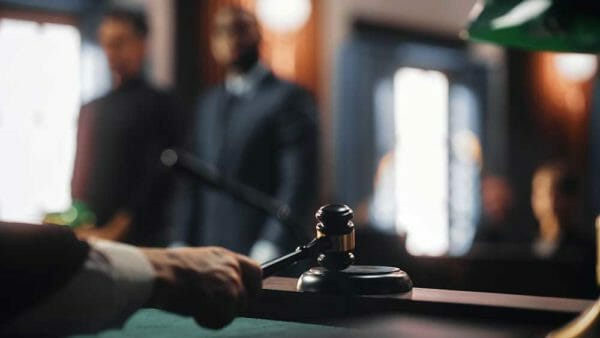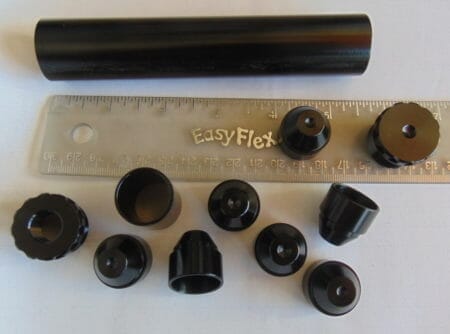
A three-judge panel from the Court of Appeals for the Fifth Circuit ruled that the National Firearms Act of 1934 (NFA) rules on suppressors are Constitutional.
In 2022, the Bureau of Alcohol, Tobacco, Firearms and Explosives (ATF) and state law enforcement officials raided the home of George Peterson in Jefferson Parish, Louisiana. Mr. Peterson operated a firearms business, PDW Solutions, LLC, out of his residence. The ATF asked for the search warrant after a Jefferson Parish Sheriff’s Office deputy allegedly purchased two handguns from the man. According to court documents, Mr. Peterson did not report the transaction. ATF regulations require a federal firearms licensee (FFL) to submit a multiple handgun sale form if more than one handgun is sold at one time.
After that sale, an ATF agent and a confidential informant allegedly committed a straw purchase at the man’s home. Mr. Peterson was also only supposed to conduct business at gun shows and out of a leased storage unit. The ATF claims that he was doing business out of his home, which violated the terms of his FFL.
During the raid on Peterson’s home, ATF agents discovered a suppressor inside a safe located in his bedroom closet. This suppressor was not purchased from a manufacturer or dealer. Mr. Peterson made the suppressor himself using a kit and materials he acquired. The found suppressor did not have a serial number and was not registered with the ATF’s National Firearms Registration and Transfer Record (NFRTR) as required by the NFA.
A grand jury in the Eastern District of Louisiana indicted Peterson for possession of an unregistered suppressor. In a pre-trial hearing, the man filed motions to dismiss the indictment and to suppress the evidence obtained through the ATF’s search of his property. He argued that the NFA’s registration requirements violated Second Amendment protections. He also claimed that the search warrant violated his Fourth Amendment rights against illegal search and seizures. The District Court rejected the two motions. Mr. Peterson entered a conditional guilty plea, reserving the right to appeal the denial of his pre-trial motions.
Mr. Peterson argued that the NFA’s suppressor-registration requirement unconstitutionally burdens his Second Amendment rights. Initially, the federal government attempted to argue that suppressors are not “arms” but merely accessories. After a pushback from Washington, that argument was withdrawn, and the Department of Justice (DOJ) admitted that suppressors are protected under the Second Amendment, but stated that they can still be regulated via the NFA.
The judges used a Bruen analysis in their decision. The first step of a Bruen analysis is to look at the original text of the Second Amendment. Mr. Peterson is a member of the “people,” and even the government admitted that suppressors are protected arms. The court proceeded to the second step, where a law must be consistent with the nation’s history and tradition of firearms regulations. This analysis is intended to be conducted through the use of historical analogues from the founding era.
The judges highlighted that Bruen challenged a “may-issue” regime. The NFA is theoretically a “shall-issue” regime. They pointed to Associate Justice Brett Kavanaugh’s comments in Footnote 9 of the Bruen opinion. In the Footnote 9 dicta, Kavanaugh said that shall-issue licensing regimes are constitutionally permissible, including fingerprinting, a background check, a mental health records check, and training in firearms handling and in laws regarding the use of force, among other possible requirements. Dicta is a statement that is not essential to a resolution of a case. It is commentary, guidance, or opinion.
The dicta states “shall-issue licensing regimes are constitutionally permissible, subject of course to an as-applied challenge if a shall-issue licensing regime does not operate in that manner in practice.”
Because of this dicta, the three-judge panel affirmed the District Court’s ruling on the Second Amendment pre-trial motion. Mr. Peterson also attempted to argue that there was a lack of probable cause for the search warrant, thereby violating his Fourth Amendment rights. The court did not agree with him and affirmed the dismissal of this pre-trial motion as well.
Mr. Peterson can ask for an en banc hearing where the panel’s decision would be vacated and the full Fifth Circuit bench would hear the case, or he could file for a writ of certiorari with the United States Supreme Court.
DOJ Lawyer Argues Suppressors are Not Protected Arms Then Reverses Course
About John Crump
Mr. Crump is an NRA instructor and a constitutional activist. John has written about firearms, interviewed people from all walks of life, and on the Constitution. John lives in Northern Virginia with his wife and sons, follow him on X at @crumpyss, or at www.crumpy.com.







Govt court rules govt tyranny is constitutional, shocker.
I think the silly courts are just shooting self in own heads.
So, they ruled “these firearms are NFA items and as such the requirement to register them per NFA is constitutional.”
Ok, where’s our craftsman 2A lawyers?
If the items are firearms then they are protected under 2A. If supes became non-firearm then they could not be governed under NFA.
Ok, where’s our craftsman 2A lawyers? Where are they?
It’s this circular BS that needs to end !!!
Of course infringement is constitutional. Don’t you understand english?
Oh, please spare me. This crap of Bruen states this but states that has got to end. I wish the supreme court would finally make it clear that shall not be infringed means exactly that and recognize that all laws requiring this that or the other thing that makes any requirement for buying or owning a gun is bullshit.
I am tired of courts leaving little tidbits of verbiage that construe things to be opposite of what they mean or different than what the original text says.
Lawyers, what a pain in the ass.
Add three names to the hang Iist.
When, exactly, did the 5th start trying to be the 9th???